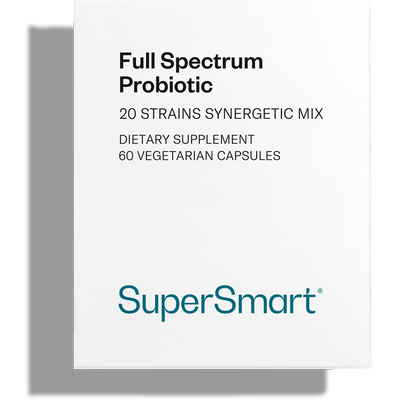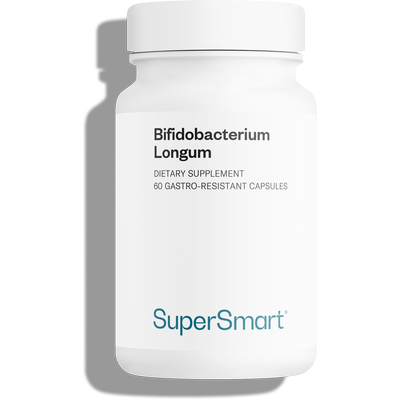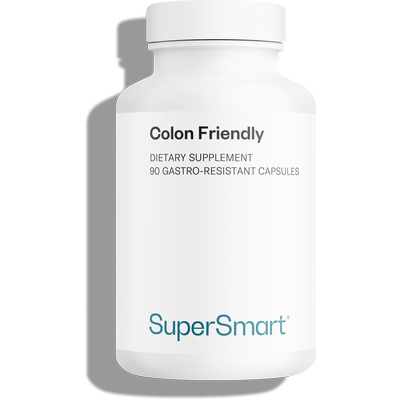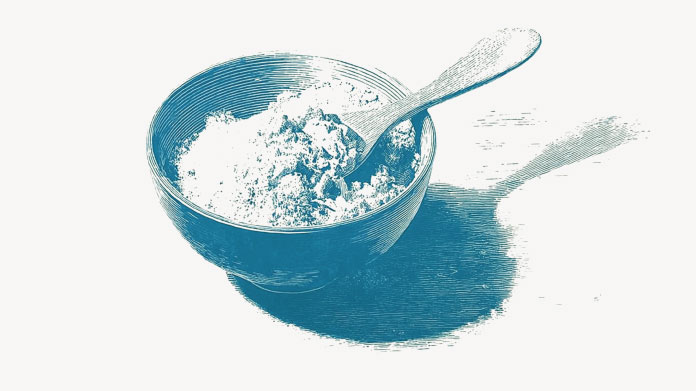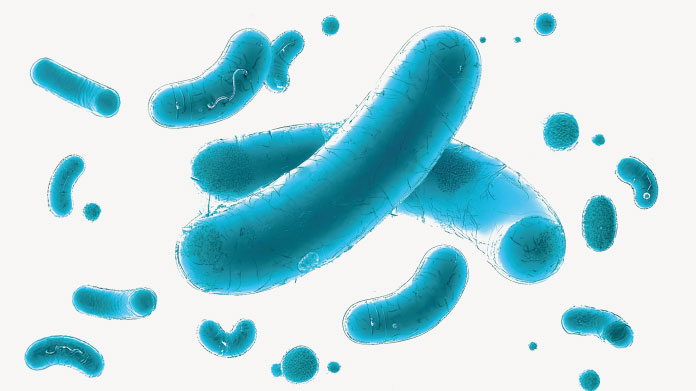Bifidobacterium longum: 6 benefits of this friendly bacterium
Bifidobacterium longum is a species of anaerobic bacterium renowned for its health benefits. Discover the 6 specific health benefits of this natural probiotic.

What is Bifidobacterium longum?
Definition of Bifidobacterium longum
Bifidobacterium longum is a rod-shaped anaerobic bacterium.
This beneficial bacterium, which lives in symbiosis with humans, is one of the first micro-organisms to colonise our intestines from birth.
Sources of this ‘good’ bacteria
Bifidobacterium longum spreads mainly via the mother's intestine, when passing through the vagina, or via mother's milk, which contains both the bacteria and specific sugars that nourish it.
In adulthood, Bifidobacterium longum is maintained by a diet rich in prebiotic fibres (garlic, onion, leek, banana, legumes, etc.), fermented foods (yoghurt, kefir, miso, sauerkraut, etc.) and appropriate probiotics.
Characteristics and subspecies of this microorganism
This species has a number of distinctive features:
- good resistance to gastric acidity, which helps it survive the passage through the stomach when it comes from food
- an ability to colonise the colon on a long-term basis, where it interacts with other beneficial bacteria
- an involvement in the fermentation of non-digestible fibres, promoting a balanced intestinal environment
Bifidobacterium longum also comes in several subspecies, the two main ones being B. longum subsp. infantis (mainly found in infants, specialising in the digestion of oligosaccharides in breast milk) and B. longum subsp. longum (more common in adults, capable of fermenting a wide range of plant-based dietary fibres).
The 6 benefits of Bifidobacterium longum
Generally speaking, Bifidobacterium longum contributes to the balance of the intestinal microbiota, which is essential to our health.
Let's take a closer look at the 6 key benefits attributed to Bifidobacterium longum.
1. Support for digestive comfort
B. longum is thought to help maintain an appropriate intestinal pH by fermenting dietary fibres, producing short-chain fatty acids (SCFAs).
These SCFAs nourish intestinal cells and promote regular transit, thus contributing to optimal digestive comfort.
Studies suggest that the increased presence of B. longum is associated with better digestion of fibre and a reduction in symptoms such as bloating (1).
2. Strengthening of the intestinal barrier
This bacterium is also thought to be involved in the production of molecules that strengthen the junction between the cells of the intestinal mucosa, thereby limiting intestinal permeability (the famous ‘leaky gut’).
By maintaining the integrity of this barrier, B. longum plays a protective role against the penetration of pathogens or potentially inflammatory substances.
Research presented in the journal Cell Host & Microbe (2) suggests that this bacterium can restore the inner layer of mucus in the colon.
3. Modulation of chronic low-grade inflammation
Through the secretion of specific metabolites, B. longum is thought to help regulate the local immune response, promoting a balance between pro- and anti-inflammatory activity.
This modulation is thought to limit chronic low-grade inflammation, which is often implicated in various metabolic and digestive pathologies.
This probiotic strain is also of interest to researchers for its potential to relieve disorders linked to irritable bowel syndrome (3).
4. Involvement in boosting immunity
Contact between B. longum and immune cells in the intestine is thought to stimulate the production of certain cytokines and antibodies, helping to improve the body's defence against infection.
This subtle interaction is thought to contribute to the maturation and regulation of the intestinal immune system (4).
5. A possible role against oxidative stress
Certain strains of B. longum appear to produce metabolites such as lactate and acetate, which nourish colon cells and support the synthesis of short-chain fatty acids (SCFAs), essential for intestinal regeneration (5).
They also express antioxidant enzymes such as superoxide dismutase.
6. Influence on the intestine-brain axis
Some research suggests that B. longum may produce or modulate neurotransmitters and signal molecules, such as GABA or tryptophan, playing an indirect role in the management of stress and anxiety.
Although these effects still require clinical confirmation, they illustrate the importance of the microbiota in the bidirectional communication between gut and brain.
A pilot study published in 2017 in Gastroenterology (McMaster University, Canada) (6) evaluated the effects of the Bifidobacterium longum NCC3001 strain in 44 adults with irritable bowel syndrome (IBS) with a mild to moderate anxiety or depression profile (Rome III criteria).
The trial was a double-blind, placebo-controlled study.
The main results, after 6 weeks of taking B. longum:
- significant reduction in depression scores
- improvement in quality of life, associated with a reduction in cerebral emotional activation (functional MRI: amygdala, fronto-limbic cortex)
Bifidobacterium longum food supplements
Although Bifidobacterium longum is found in certain yoghurts and other fermented foods, its presence is neither guaranteed nor systematically mentioned on labels.
Supplementation is therefore a particularly effective option for boosting the presence of B. longum in the intestine, especially in cases of microbiota imbalance or persistent digestive disorders.
To ensure that supplementation is really relevant, check the following quality criteria:
- Precise identification of the strains is essential. Each strain has specific properties, so it's important that these are clearly indicated (e.g. B. longum 35624, B. longum 1714, B. longum BB536, etc.).
- The gastro-resistant nature of the capsules means that the probiotics are better able to survive the acidity of the stomach and reach the intestine in excellent condition.
- The dosage must be high enough to ensure optimal action, without unnecessary excess.
![]() Discover the probiotic Bifidobacterium Longum, a highly concentrated single-strain formula (BB536) for your intestines.
Discover the probiotic Bifidobacterium Longum, a highly concentrated single-strain formula (BB536) for your intestines.
Combining several complementary strains can also be a wise approach for synergistic action on the microbiota:
![]() Discover Colon Friendly probiotics, a combination of 4 carefully selected strains (Saccharomyces cerevisiae, Bifidobacterium longum infantis, Bifidobacterium longum longum and Lactobacillus acidophilus).
Discover Colon Friendly probiotics, a combination of 4 carefully selected strains (Saccharomyces cerevisiae, Bifidobacterium longum infantis, Bifidobacterium longum longum and Lactobacillus acidophilus).
Some broad-spectrum formulas are even extremely rich in strains:
![]() Discover Full Spectrum Probiotic, a broad-spectrum formula bringing together 20 different strains (Lactobacillus, Bifidobacterium including Bifidobacterium longum infantis and Bifidobacterium longum longum, Lactococcus, etc.).
Discover Full Spectrum Probiotic, a broad-spectrum formula bringing together 20 different strains (Lactobacillus, Bifidobacterium including Bifidobacterium longum infantis and Bifidobacterium longum longum, Lactococcus, etc.).
SUPERSMART ADVICE
References
- Vitellio P, Celano G, Bonfrate L, Gobbetti M, Portincasa P, De Angelis M. Effects of Bifidobacterium longum and Lactobacillus rhamnosus on Gut Microbiota in Patients with Lactose Intolerance and Persisting Functional Gastrointestinal Symptoms: A Randomised, Double-Blind, Cross-Over Study. Nutrients. 2019 Apr 19;11(4):886. doi: 10.3390/nu11040886. PMID: 31010241; PMCID: PMC6520754.
- Bifidobacteria or Fiber Protects against Diet-Induced Microbiota-Mediated Colonic Mucus Deterioration
- Lenoir M, Wienke J, Fardao-Beyler F, Roese N. An 8-Week Course of Bifidobacterium longum 35624® Is Associated with a Reduction in the Symptoms of Irritable Bowel Syndrome. Probiotics Antimicrob Proteins. 2025 Feb;17(1):315-327. doi: 10.1007/s12602-023-10151-w. Epub 2023 Sep 13. PMID: 37702965; PMCID: PMC11832793.
- Dong J, Ping L, Cao T, Sun L, Liu D, Wang S, Huo G, Li B. Immunomodulatory effects of the Bifidobacterium longum BL-10 on lipopolysaccharide-induced intestinal mucosal immune injury. Front Immunol. 2022 Aug 24;13:947755. doi: 10.3389/fimmu.2022.947755. PMID: 36091059; PMCID: PMC9450040.
- Averina OV, Kovtun AS, Mavletova DA, Ziganshin RH, Danilenko VN, Mihaylova D, Blazheva D, Slavchev A, Brazkova M, Ibrahim SA, Krastanov A. Oxidative Stress Response of Probiotic Strain Bifidobacterium longum subsp. longum GT15. Foods. 2023 Sep 7;12(18):3356. doi: 10.3390/foods12183356. PMID: 37761064; PMCID: PMC10530004.
- Pinto-Sanchez MI, Hall GB, Ghajar K, Nardelli A, Bolino C, Lau JT, Martin FP, Cominetti O, Welsh C, Rieder A, Traynor J, Gregory C, De Palma G, Pigrau M, Ford AC, Macri J, Berger B, Bergonzelli G, Surette MG, Collins SM, Moayyedi P, Bercik P. Probiotic Bifidobacterium longum NCC3001 Reduces Depression Scores and Alters Brain Activity: A Pilot Study in Patients With Irritable Bowel Syndrome. Gastroenterology. 2017 Aug;153(2):448-459.e8. doi: 10.1053/j.gastro.2017.05.003. Epub 2017 May 5. PMID: 28483500.
Keywords
17 Hours
great experience
Easy ordering, fast deliver, very professionally.
Natasa
4 Days
this company and its products are…
this company and its products are perfect: I have been their customer for three years , prices are reasonable for the high quality they offer , the products are of very good quality not just plainly "normal" , delivery is quite fast. we are very satisfied with them.
Gabriel Diacakis
4 Days
TOP service TOP products will buy again…
TOP service TOP products will buy again and again
PINOTTI Giorgio
6 Days
Trustworthy company with tested products
Trustworthy company with tested products
Trusted
10 Days
Efficiency and speed
Efficiency and speed
Cuccie
12 Days
GOOD BRAND IN FOOD COMPLEMENTS
GOOD BRAND IN FOOD COMPLEMENTS - SERIOUS WITH GOOD DOCUMENTS AND DETAILS SCIENTIST. AND SERIOUS HONNEST COMMERZIALISATION. I HAVE TRUST IN THEIR PRODUCTS.
FENOGLIO Guy
14 Days
Very good experience
Very good experience, the products arrived in time, in perfect condition and are good quality. Thank you.
GABI TIRCOCI
19 Days
very good expereince
very good expereince
Jelena Đaković
19 Days
Very good products.
Very good products.
Agnes BENDSAK
22 Days
Just OK
Just OK, ordering from company for many years and being safisfied
Lynn Mae
22 Days
Recomendo
Produtos encomendados são recebidos atempadamente e de acordo com o anunciado! Muito satisfeita!
Carla Sofia
23 Days
Everything is great!
Everything is great!
Jonas
28 Days
The delivery was fast and the product…
The delivery was fast and the product is great
SOMMARIVA Gianni
29 Days
Great service and lots of information
Great service and lots of information
Gabi
32 Days
Service Satisfaction
I’m satisfied with the service; it fulfilled what it set out to do.
Anfhony Abreu
of experience
your money back
##montant## purchase


